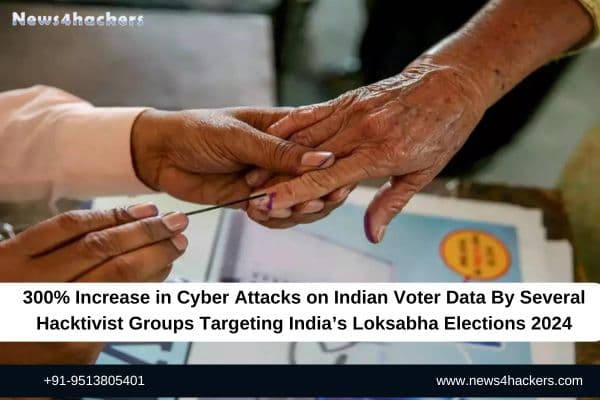300% Increase in Cyber Attacks on Indian Voter Data By Several Hacktivist Groups Targeting India’s Loksabha Elections 2024

300% Increase in Cyber Attacks on Indian Voter Data By Several Hacktivist Groups Targeting India’s Loksabha Elections 2024
Hacktivist groups are targeting voter data as cyber-attacks increase in anticipation of India’s 2024 Loksabha Elections. The famous cybersecurity organization Resecurity has identified 16 groups that are taking advantage of geopolitical tensions to interfere with the legitimacy of elections.

New Delhi: Resecurity, a cybersecurity firm based in the United States, has detected a substantial increase in cyber-attacks that are focused on the electoral process as India preparations for its general election from April 19 to June 1, 2024. The objective of these attacks, which are coordinated by a variety of independent hacktivist organizations, is to breach the personally identifiable information (PII) of Indian citizens and disrupt the election. In the midst of a fraught geopolitical climate, the election that will determine all 543 members of the Lok Sabha is confronted with unprecedented cyber threats.
An Increase in Cyber Activity Correlated with the #OpIndia and #OpIsrael Campaigns
The significant increase in cyber-attacks can be traced back to the #OpIndia campaign, which was initiated last year. Following the initiation of #OpIsrael, there was a dramatic increase of nearly 300%. This occurred concurrently with an increase in online demonstrations concerning the Israel-Gaza conflict. India has emerged as a primary target for foreign threat actors and nation-state groups, with a GDP exceeding $3.4 trillion and a population exceeding 1.4 billion.

The current geopolitical volatility in the Middle East and Eastern Europe underscores the significance of safeguarding elections from cyber threats in order to maintain the global democratic order, as emphasized in Resecurity’s most recent report. The report emphasizes the necessity of vigilance and comprehensive cybersecurity measures, as it identifies comparable patterns of cyber-attacks that have been observed in elections in 17 other countries.
Key Threat Groups and Their Activities
The primary perpetrators of the attacks on India’s election infrastructure have been identified by Resecurity as 16 hacktivist groups. These organizations comprise the following:
- Anon Black Flag | Indonesia
- Anonymous Bangladesh
- Morocco Black Cyber Army
- Toxcar Cyber Team
- Islamic Cyber Team
- Lulzsec Indonesia
- TEAM CYBER MAFIA
- ANON TEN BD
- Ketapang Grey Hat Team
- ANON SEC BD
- Team Ahadun Ahad (2.0)
- Bangladesh Dark Net
- Nixon Cyber Team
- Cyber Sheild Force BD
- UnitedSec-313
- Sylhet Gang
Before the most recent elections, these 16 groups exploited geopolitical narratives to target a variety of organizations in India, including law enforcement, government, healthcare, financial, educational, and private sectors.
Leaked Voter ID Cards and PII
Voter ID cards are being leaked onto the Dark Web, which is a significant concern raised by Resecurity. These identity documents, which were issued by the Election Commission of India, have been compromised, potentially by third-party entities involved in Know-Your-Customer (KYC) processes. Law enforcement and federal authorities have been informed of these breaches by Resecurity, which has also provided samples of the disclosed data.

The primary goal of these disclosures is to erode public confidence in the election system by implying vulnerabilities that do not necessarily exist.

Rather, these breaches are frequently the consequence of identity theft from compromised systems that are utilized for lending, insurance, and other services that necessitate KYC documentation.
Public Opinion Manipulation and Influence Campaigns
Resecurity has observed numerous campaigns that are designed to manipulate public opinion and instill distrust in the government, in addition to data intrusions. These campaigns frequently target prominent leaders, such as the Prime Minister, and aim to instigate social conflict among various population groups in India.

By incorporating data breaches, website defacements, and politically charged narratives, these organizations endeavor to obscure the lines of attribution and operate as independent hacktivists.

Their coordinated endeavors indicate that external influences, potentially nation-state actors, are attempting to destabilize India.
“False Flags” and Geopolitical Exploitation
Cyber threat actors have also exploited recent geopolitical developments, such as the change in Maldives’ foreign policy under President Mohamed Muizzu. Potentially as a false flag operation to escalate tensions between India and the Maldives, pro-India cyber groups have launched attacks on critical Maldivian institutions.

This activity underscores the more comprehensive approach of cyber-influence operations, which are designed to influence foreign policy and induce geopolitical instability.

Resecurity underscores the necessity of diplomatic channels and comprehensive investigations to mitigate these risks and foster cyber peace.
Public Awareness and Risk Mitigation
In order to protect digital identity data from these threats, Resecurity recommends the implementation of stringent data protection regulations and the implementation of comprehensive security measures.

It is imperative to enhance cybersecurity awareness among Indian citizens in order to prevent the dissemination of disinformation and preserve confidence in the electoral process.
Key Suggestions for Indian Citizens:
| Remain Informed | Be cautious of disinformation campaigns and stay informed by following reputable sources of information. |
| Personal Data Security | By adhering to the most effective cybersecurity protocols, you can safeguard your personal information. |
| Report Suspicious Activity | Immediately notify the appropriate authorities if you come across suspicious online activity or data breaches. |
| Ensure the Credibility of Sources | Prior to reacting or disseminating information, it is imperative to confirm its credibility. |
The significance of cybersecurity in safeguarding democratic processes is underscored by the recent increase in cyber-attacks as India prepares for its general election. The findings of Resecurity are a critical reminder of the necessity of proactive measures and vigilance in order to counteract the actions of malevolent actors who are seeking to undermine public trust and disrupt the electoral system.
We will continue to closely monitor the situation, so remain tuned for additional updates and detailed insights.
About The Author:
Yogesh Naager is a content marketer who specializes in the cybersecurity and B2B space. Besides writing for the News4Hackers blog, he’s also written for brands including CollegeDunia, Utsav Fashion, and NASSCOM. Naager entered the field of content in an unusual way. He began his career as an insurance sales executive, where he developed an interest in simplifying difficult concepts. He also combines this interest with a love of narrative, which makes him a good writer in the cybersecurity field. In the bottom line, he frequently writes for Craw Security.
READ MORE ARTICLE HERE
Deputy Bank Manager of Yes Bank Arrested from Mumbai for Providing Accounts to Cyber Thugs
CBI Registers Case Against Indore Youth for Online Sexual Assault Complaint of an Australian Girl
Malicious Threat Actors Exploiting GitHub and FileZilla To Distribute a Malware Cocktail






